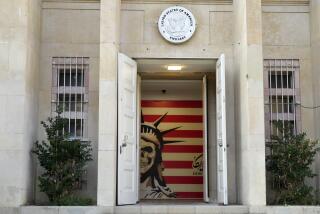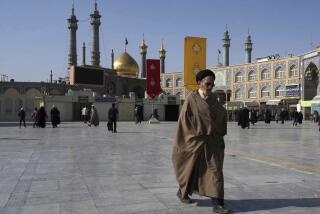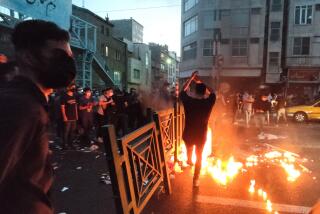Iran President Urges ‘Rule of Law’
- Share via
TEHRAN — Marking the 20th anniversary of the revolution that toppled the shah and created today’s Islamic Republic, President Mohammad Khatami said Thursday that Iran should work for stability, rule of law, tolerance and reducing tensions with the outside world.
Khatami praised the revolution for bringing about a more spiritual nation. In an address that was not overtly political, he still managed to imply that unlawful arrests and killings carried out by religious radicals should become a thing of the past.
The popular president spoke before more than 100,000 people packed into Tehran’s vast Freedom Square, which was decked out in Iranian flags and banners displaying the image of the revolution’s late leader, Ayatollah Ruhollah Khomeini.
“Sisters and brothers, this government will begin the republic’s third decade under the slogan of stability, and this will not be possible without the rule of law,” Khatami said.
In an indirect reference to the power struggle since his election in May 1997, Khatami also said that all three branches of the government--the executive, legislature and judiciary--should work together and “consider the rights of people regardless of different attitudes.”
Khatami’s speech was notable for the absence of any castigation of the West or hostility toward the United States. Rather, he underlined his hopes for improved relations with other countries.
“Today the Islamic Republic has the respect of the international community, without having abandoned its values one bit,” he said. “Also, the government is pursuing a policy of detente, which is one of the most important goals of the revolution.”
The rally was not totally devoid of the traditional anti-Americanism. In the hours before Khatami spoke, chant leaders had led the crowd in calls of “Death to America!” Small groups burned American flags.
The country’s hard-line supreme leader, Ayatollah Ali Khamenei, issued a statement saying the United States continues to exhibit “irreconcilable enmity” toward the Islamic revolution.
Khatami used the rally to urge participation in the country’s first municipal elections scheduled Feb. 26. Although the country’s Islamic constitution adopted in 1979 called for voting for municipal and provincial councils to allow people to govern their local affairs, this provision had not been implemented.
Reformers who support Khatami hope to win, eventually wrest power from conservatives who control the parliament and courts, and accelerate the movement toward democracy in the country of 65 million people.
Conservatives have been on the defensive since it was revealed that several “renegade” intelligence agents killed four political dissidents last year.
Khatami’s invocation of the constitution and the “rule of law” in his speech seemed to be, in part, a veiled allusion to those killings and the need to stem the tendency of rightist groups and religious extremists to take the law in their own hands.
The rally in Freedom Square is an annual event, but bigger this year because of its being the 20th anniversary. Similar gatherings were held across Iran to mark the day the shah’s army was ordered to stand down, effectively ending 2,500 years of monarchical rule.
At that time, Shah Mohammed Reza Pahlavi had already left the country.
Thursday’s events culminated a 10-day observance, “The Days of Dawn,” that included rallies, memorials, special television programs, a film and theater festival, and the country’s “First Islamic Pop Festival.”
Despite the government’s best efforts to project a joyful atmosphere, the proceedings had a certain rote quality.
The conservative-oriented Tehran Times acknowledged in an editorial that many ordinary people believe that the revolution has failed to meet all its goals. It cited ongoing problems including high inflation, unemployment and corruption.
Nevertheless, the newspaper insisted: “The faithful Iranian people still adhere wholeheartedly to the ideals and principles of the Islamic Revolution.”
More to Read
Sign up for Essential California
The most important California stories and recommendations in your inbox every morning.
You may occasionally receive promotional content from the Los Angeles Times.













